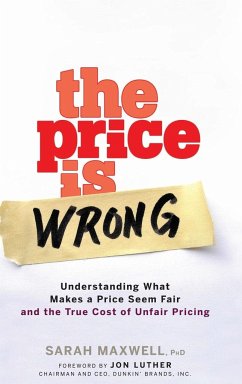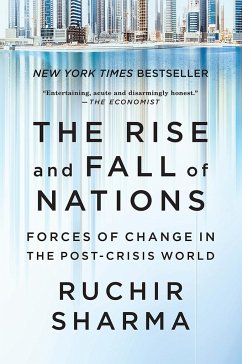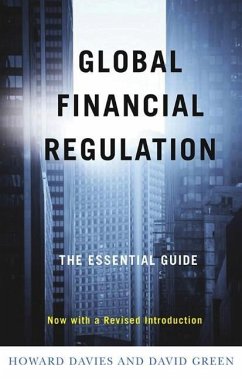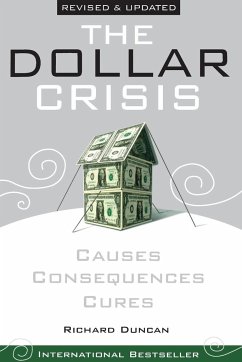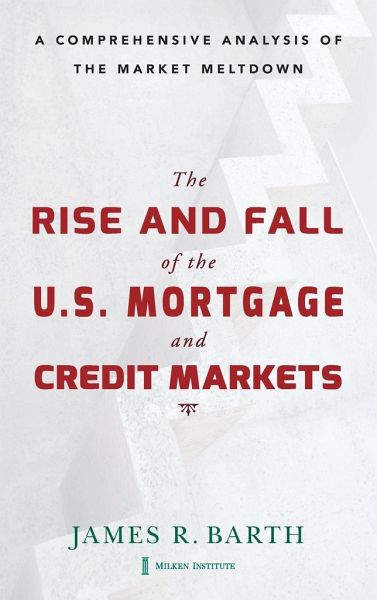
The Rise and Fall of the Us Mortgage and Credit Markets
A Comprehensive Analysis of the Market Meltdown
By James R. Barth, Tong Li, Wenling Lu et al.
Versandkostenfrei!
Versandfertig in über 4 Wochen
45,99 €
inkl. MwSt.
Weitere Ausgaben:

PAYBACK Punkte
23 °P sammeln!
"The Rise and Fall of the US Mortage and Credit Markets" offers a comprehensive examination of the mortgage market meltdown and the resulting impact on the financial sector of the economy. Using extensive data, the book provides an insightful and detailed look at the housing, mortgage and credit market. In addition, the book examines financial innovations, particularly securitization, and the impact on the financial crisis here. The book offers a view of the Administration's proposals to address the problems and how a similar crisis can be avoided. In addition, the author will compare the restructuring proposals of the US government to steps taken in other countries in both Europe and Asia.
Owning a home can bestow a sense of security and independence. But today, in a cruel twist, many Americans now regard their homes as a source of worry and dashed expectations. How did everything go haywire? And what can we do about it now?
In The Rise and Fall of the U.S. Mortgage and Credit Markets, renowned finance expert James Barth offers a comprehensive examination of the mortgage meltdown. Together with a team of economists at the Milken Institute, he explores the shock waves that have rippled through the entire financial sector and the real economy. Deploying an incredibly detailed and extensive set of data, the book offers in-depth analysis of the mortgage meltdown and the resulting worldwide financial crisis. This authoritative volume explores what went wrong in every critical area, including securitization, loan origination practices, regulation and supervision, Fannie Mae and Freddie Mac, leverage and accounting practices, and of course, the rating agencies. The authors explain the steps the government has taken to address the crisis thus far, arguing that we have yet to address the larger issues.
The Rise and Fall of the U.S. Mortgage and Credit Markets analyzes the factors that should drive reform and explores the issues that policymakers must confront in any future reshaping of financial market regulations.
James Barth is a Senior Fellow at the Milken Institute and the Lowder Eminent Scholar in Finance at Auburn University. He was chief economist of the Federal Home Loan Bank Board and later of the Office of Thrift Supervision. His colleagues at the Milken Institute who helped with the book are Tong Li, Wenling Lu, Triphon Phumiwasana, and Glenn Yago.
In The Rise and Fall of the U.S. Mortgage and Credit Markets, renowned finance expert James Barth offers a comprehensive examination of the mortgage meltdown. Together with a team of economists at the Milken Institute, he explores the shock waves that have rippled through the entire financial sector and the real economy. Deploying an incredibly detailed and extensive set of data, the book offers in-depth analysis of the mortgage meltdown and the resulting worldwide financial crisis. This authoritative volume explores what went wrong in every critical area, including securitization, loan origination practices, regulation and supervision, Fannie Mae and Freddie Mac, leverage and accounting practices, and of course, the rating agencies. The authors explain the steps the government has taken to address the crisis thus far, arguing that we have yet to address the larger issues.
The Rise and Fall of the U.S. Mortgage and Credit Markets analyzes the factors that should drive reform and explores the issues that policymakers must confront in any future reshaping of financial market regulations.
James Barth is a Senior Fellow at the Milken Institute and the Lowder Eminent Scholar in Finance at Auburn University. He was chief economist of the Federal Home Loan Bank Board and later of the Office of Thrift Supervision. His colleagues at the Milken Institute who helped with the book are Tong Li, Wenling Lu, Triphon Phumiwasana, and Glenn Yago.




